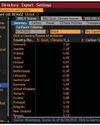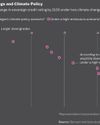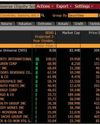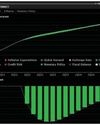Twentytwo was billed as one of the biggest office towers in Europe. Overlooking he Bank of England, it would be built right in the heart of London’s main financial district—and amid all the uncertainty over rexit. So how’s that working out?

IT WAS A TRICKY TIME for the commercial real estate business in London. Within days, Britons would be voting on whether to remain in the European Union or leave. The French insurance giant Axa SA was trying to figure out how the outcome would affect its investments across the Channel. Paris-based executives of Axa Investment Managers’ Real Assets unit held a series of conference calls with their London colleagues to plan for what to do in the event of a leave vote.
One executive on the line from London—Harry Badham, Axa’s head of U.K. real estate development—had a lot at stake. He was about to sign a construction contract that would launch Twentytwo, a £1 billion ($1.3 billion) project to build the tallest skyscraper in the City of London. Unlike his colleagues, however, Badham was relaxed about the outcome. He was going to be out of town the day after the June 23, 2016, vote, having booked a trip in the expectation that remain would win. “When I told them I was planning to go fishing that day,” he says, “they thought I was joking.”
So the morning after, as harried traders in the City of London hunched over screens displaying the damage wrought on the pound by the surprise vote to leave, Badham was 70 miles away on the peaceful chalk banks of the River Test.
Unsurprisingly, his phone lit up. The project’s investors—a global consortium of sovereign and pension funds—wanted to know what the shocking result would mean for them. After all, this was supposed to be one of the largest office buildings in Europe, and it was going up in London’s financial district: Brexit ground zero.
This story is from the February - March 2019 edition of Bloomberg Markets.
Start your 7-day Magzter GOLD free trial to access thousands of curated premium stories, and 9,000+ magazines and newspapers.
Already a subscriber ? Sign In
This story is from the February - March 2019 edition of Bloomberg Markets.
Start your 7-day Magzter GOLD free trial to access thousands of curated premium stories, and 9,000+ magazines and newspapers.
Already a subscriber? Sign In

See Which Countries Are Falling Behind On Climate Change
Under the Paris Agreement, 190 countries and the European Union pledged to take steps to hold the global temperature rise to less than 2C (3.6F) from preindustrial levels—and preferably 1.5C.

Billionaires Vie for the Future of Brazilian Finance
An escalating battle between two billionaires is upending the financial community in São Paulo, Latin America’s wealthiest city.

Ford Foundation's Darren Walker: ‘We Have to Get Uncomfortable'
DARREN WALKER, 62, disrupted his Wall Street life more than 25 years ago when he left what is now UBS Group AG to volunteer at a school and eventually pursue a career in community development and philanthropy. Since 2013 he’s been at the pinnacle of the philanthropic world as president of the Ford Foundation, created by the family of automaker Henry Ford during the Great Depression to advance human welfare.

Fueling the Ener Transition
I MAY BE BIASED, but some of the most important research and data on the Bloomberg terminal lies in one of its lesser-known functions: {BNEF }

Dig Into Analysts' Estimates for Disruptive Companies
THE PANDEMIC ERA generated a whole wave of disruptive companies as it accelerated the introduction of new products and services in areas including artificial intelligence, digitization, electronic payments, online meeting platforms, and virtual currencies.

Climate Risks Come for Sovereign Credit
FOR YEARS climate scientists have warned about the ferocious wildfires and hurricanes that are now overwhelming many communities. Today alarms are ringing about a related financial danger: risks lurking within government bonds, the biggest part of the global debt market.

Responsible-Investing Pioneer Lydenberg Says ESG Needs An Upgrade
STEVE LYDENBERG’S passion for social change was inspired by anti-Vietnam War demonstrations, consumer boycotts, and the movement to divest from apartheid South Africa. But he didn’t take to the streets. Instead, Lydenberg turned to the world of finance to help catalyze societal change.

Engine No. 1's Grancio: ‘People Will Appreciate an Economic Argument'
ENGINE NO. 1 sent shock waves across corporate America in May when the fledgling investment firm won a boardroom battle with Exxon Mobil Corp., securing three seats on the oil and gas giant’s board after purchasing only about $40 million of its stock.

Find Out Which Companies May Ramp Up Payouts After Covid
AS THE PANDEMIC DISRUPTED business last year, many companies cut or suspended dividends. Which will boost their payouts when economies pick up again?

Get Into the Minds of Central Bankers as They Navigate Shocks
HAVE YOU EVER WONDERED how central bankers forecast the impact of shocks on the economy?